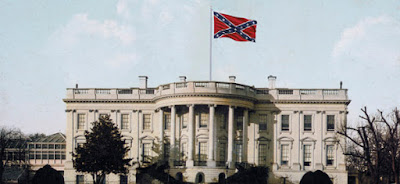Game of Confederates? Thoughts on HBO's Upcoming Civil War Alternate History
I'm quoted in today's New York Times article by David Itzkoff on HBO's projected alternate history series, to be called Confederate, about a world in which the Confederacy defeated the Union in the Civil War.
Undoubtedly, the fact that the project is being pursued by David Benioff and D. B. Weiss, the creators of the megahit HBO show, Game of Thrones, explains much of the attention to the topic. So does the relevance of the Civil War in present day America, where ongoing racial prejudice against African Americans angers the left and the removal of confederate statues angers the right.
I would argue that the discontent expressed by certain critics about a Civil War alternate history merely underscores the genre's importance, especially insofar as it helps us revise, rethink, and wrestle with difficult historical legacies.
This is equally true of the recent Amazon Prime hit show, The Man in the High Castle -- but only because contemporary political trends have been headed in a right wing, if not neo-fascist, direction.
Counterfactually speaking, if we were living in more politically stable times, The Man in the High Castle would not have had the resonance it does. It would not be controversial to interpret the show -- as many have -- as a commentary on present day American "fascism." Without the backdrop of today's political climate, the show's plot would be relatively cliché. After all, for decades, it's easy to hate Nazis because of their unambiguous evil.
This is less true of the Civil War.
No matter how many people view the Confederacy as equally evil as the Third Reich due to the institution of slavery, many others continue to overlook it and instead seek inspiration in Southern "heritage." That explains much of the discomfort about how HBO's Confederacy may portray the topic.
It's certainly understandable.
Still, to my mind, it's premature to judge the show before it begins shooting.
Undoubtedly, the fact that the project is being pursued by David Benioff and D. B. Weiss, the creators of the megahit HBO show, Game of Thrones, explains much of the attention to the topic. So does the relevance of the Civil War in present day America, where ongoing racial prejudice against African Americans angers the left and the removal of confederate statues angers the right.
I would argue that the discontent expressed by certain critics about a Civil War alternate history merely underscores the genre's importance, especially insofar as it helps us revise, rethink, and wrestle with difficult historical legacies.
This is equally true of the recent Amazon Prime hit show, The Man in the High Castle -- but only because contemporary political trends have been headed in a right wing, if not neo-fascist, direction.
Counterfactually speaking, if we were living in more politically stable times, The Man in the High Castle would not have had the resonance it does. It would not be controversial to interpret the show -- as many have -- as a commentary on present day American "fascism." Without the backdrop of today's political climate, the show's plot would be relatively cliché. After all, for decades, it's easy to hate Nazis because of their unambiguous evil.
This is less true of the Civil War.
No matter how many people view the Confederacy as equally evil as the Third Reich due to the institution of slavery, many others continue to overlook it and instead seek inspiration in Southern "heritage." That explains much of the discomfort about how HBO's Confederacy may portray the topic.
It's certainly understandable.
Still, to my mind, it's premature to judge the show before it begins shooting.



Comments
See more review: Matching games
Hunt: Showdown
A Plague Tale: Innocence